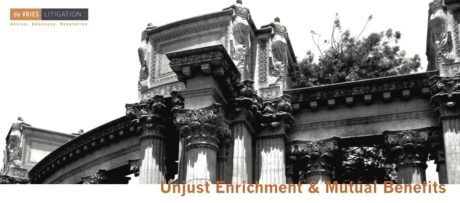Unjust enrichment is when one person is “enriched” at the expense of another’s monetary contributions or efforts otherwise without a legal reason. Determining whether one party was unjustly enriched can be complicated where the parties mutually benefit from each other’s assets or actions. In its recent decision of Granger v Granger, the Ontario Court of Appeal clarified how to determine whether there has been unjust enrichment in such a situation.
Katarina Granger has two children: John and Helena. The core of the family’s dispute related to the family home. The house was purchased in 1981, and title was taken in Katarina’s name only. John moved into the house in 1984 and lived with his mother for 30 years. During that time, John looked after his mother and the house. In return, John claimed that Katarina initially promised him half of the house upon her death, and later promised him the entire house upon her death. Helena moved into the house in 2012 and, as Katarina’s attorney for property, Helena transferred title to the house to Katarina and herself as joint tenants.
In September 2014, Katarina and Helena brought an application to evict John and his common-law spouse from the house. Among other relief, John challenged his mother’s power of attorney in favour of Helena and sought a beneficial interest in the house.
The lower court judge dismissed John’s allegations that Helena unduly influenced their mother, and evicted John and his spouse from the house. A trial was then held to determine whether John had an interest in the house. The trial judge dismissed John’s claims, finding none of the parties credible and most of the documentary evidence submitted unreliable. John appealed.
Writing for a unanimous court, Justice Juriansz allowed the appeal, finding that the trial judge erred in denying John’s unjust enrichment claim. His Honour found that John was entitled to $438,113.00 in damages, to be recovered from the house’s sale proceeds. Justice Juriansz also revoked Katarina’s power of attorney.
Unjust Enrichment
When a person claims unjust enrichment, he or she has the burden of proving that: (i) there was an enrichment of the defendant by the plaintiff; (ii) a corresponding deprivation of the plaintiff; and (iii) the absence of a juristic reason for the enrichment. If a claimant proves there was unjust enrichment, the defendant then has an opportunity to defend against it or to reduce the remedy requested.
While the trial judge found much of the evidence unreliable, he ultimately looked at all of the benefits each of John and Katarina received while living in the same house. The trial judge accepted that John provided domestic services (i.e. maintenance and repairs, renovations, housekeeping, meal preparation, etc.), but found there was not a “net benefit” to John “in light of the value of the accommodation in Katarina’s home”.
Justice Juriansz held that the trial judge erroneously considered a “net benefit” on Katarina at the outset of the unjust enrichment analysis. His Honour made it clear that an analysis of whether there were mutual benefits should be considered at the defence/remedy stage of the analysis, and that the defendant has the burden of proving mutual benefits. In undertaking a “net benefit” analysis at the outset, the trial judge had effectively required John to prove that he did not receive benefits from his mother.
Justice Juriansz, agreeing with the trial judge that John had provided domestic services to his mother, accepted the report of a valuation consultant that valued John’s services at $438,113.00. His Honour also found John to have satisfied the burden of proving that there had been a corresponding deprivation and no juristic reason for the enrichment to his mother.
Justice Juriansz explained that, since John established a prima facie case of unjust enrichment, Katarina bore the onus of proving why the enrichment should be retained, as well as establishing a valid defence to limit John’s requested remedy. His Honour recapped that “offsetting benefits” should be considered at this stage. In this case, Justice Juriansz found that Katarina failed to prove John benefited from alleged rent-free accommodation, such that there was no mutual conferral of benefits.
Power of Attorney
As mentioned earlier, in March 2015, the trial judge found Katarina’s power of attorney valid. However, Justice Juriansz noted that the trial judge’s findings made after trial were inconsistent with his March 2015 ruling. For example, his Honour pointed to the trial judge’s conclusions that he had “little to no doubt that Helena has orchestrated all of the events giving rise to the transfer of the property to herself and Katarina in joint tenancy and the execution of new wills”. Therefore, Justice Juriansz declared Katarina’s power of attorney invalid and required Helena to account for her management of Katarina’s property.
The Court of Appeal also concluded that a “significant portion of the trial” was dedicated to examining John’s claims, which the trial judge found not to be true. The appeal was a qualified success for John, and his cost award reflected that.
It is important to note that any benefits conferred by a defendant on the claimant must be considered at the “defence/remedy stage” of the unjust enrichment analysis and not concurrently with determining what benefits the claimant conferred on the defendant. The latter approach would incorrectly shift the burden of proving mutual benefit conferral to the claimant.

